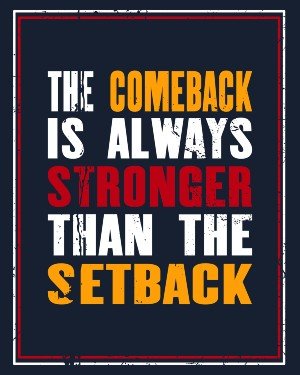Setbacks are an inevitable part of life. They can be small, such as a simple mistake, or large, like the loss of a job. In any case, they are often difficult to deal with and can have serious consequences.
The best way to handle setbacks is to recognize them for what they are and take steps to move forward. Begin by accepting that the setback has happened and then focus on what you can do to improve the situation. Ask yourself what went wrong and why, then identify ways to prevent it from happening again.
Take some time to acknowledge the emotions you’re feeling, but don’t let them overwhelm you. It’s okay to feel discouraged or angry but don’t dwell on these feelings for too long. Instead, focus on how you can use the setback as an opportunity to learn and grow.
A friend shared this with me via email. I found the advice very useful, and in turn, I am sharing this advice with you.
Setbacks are a part of life. The next time you’re facing a setback, here are a few stories about people who used a setback as a set-up for a comeback:
Lucille Ball: She began studying to become an actress in 1927 and was told by the head instructor of the John Murray Anderson Drama School, “Try any other profession. Any other profession.”
Clint Eastwood and Burt Reynolds: In 1959, a Universal Pictures executive dismissed them at the same meeting with the following statements. To Burt Reynolds: “You have no talent.” To Clint Eastwood: “You have a chip on your tooth, your Adam’s apple sticks out too far, and you talk too slow.”
Alexander Graham Bell: When he invented the telephone in 1876, it didn’t ring off the hook with calls from potential backers. After making a demonstration call, President Rutherford Hayes said, “That’s an amazing invention, but who would ever want to use one of them?”
Chester Carlson: In the 1940’s, this young inventor took his idea to 20 corporations, including some of the biggest in the country. They all turned him down. In 1947 – after seven long years of rejections – he finally got a tiny company in Rochester, NY, the Haloid Company, to purchase the rights to his electrostatic paper-copying process. Haloid became Xerox corporation, and both it and Carlson became very rich.
Abraham Lincoln: He entered the Blackhawk War (1831-1832) as a captain. By the end of the war, he had been demoted to the rank of private.
J.K. Rowling: Author of the Harry Potter series, Joanne was an aspiring writer and single mother living on welfare with her young daughter in an unheated, mice-infested flat. Her first book was rejected by 12 publishers before the world met Harry Potter in 1997.
And then there was the young man who submitted a paper to his Yale University management professor and got this response: “The concept is interesting and well-formed, but in order to earn better than a ‘C,’ the idea must be feasible.” The young man was Fred Smith, his paper proposed reliable overnight delivery service, and Fred went on to found FedEx Corp.










